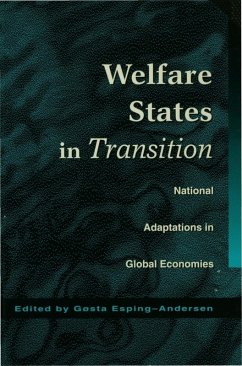This wide-ranging comparative analysis of contemporary and future changes in welfare states looks at the different trajectories of the welfare states of Europe, North America, the Antipodes, and the emerging scenarios in Latin America, East Asia and Central and Eastern Europe.
Leading experts on each of these regions examine the current structures of social protection, consider the causes of the current welfare state crisis and highlight evolving trends for welfare policy. Different welfare states are shown to manifest different forms of crisis. Among the symptoms of crisis, Welfare States in Transition suggests that the effect of popluation ageing is exaggerated, and an at least equally fundamental challenge lies in the revolution of the modern family and the changing economic role of women. The contributors are sceptical about the neo-liberal formula for reform, not only because it increases inequality but also because it does not address the growing need for an active social investment policy to ensure against entrapment in poverty or low-paid jobs.
Leading experts on each of these regions examine the current structures of social protection, consider the causes of the current welfare state crisis and highlight evolving trends for welfare policy. Different welfare states are shown to manifest different forms of crisis. Among the symptoms of crisis, Welfare States in Transition suggests that the effect of popluation ageing is exaggerated, and an at least equally fundamental challenge lies in the revolution of the modern family and the changing economic role of women. The contributors are sceptical about the neo-liberal formula for reform, not only because it increases inequality but also because it does not address the growing need for an active social investment policy to ensure against entrapment in poverty or low-paid jobs.
Dieser Download kann aus rechtlichen Gründen nur mit Rechnungsadresse in A, D ausgeliefert werden.









